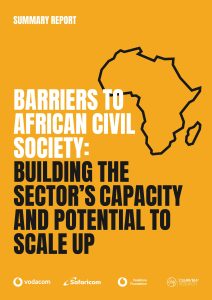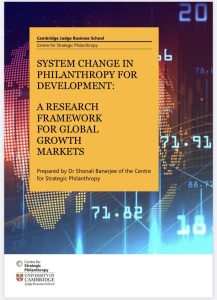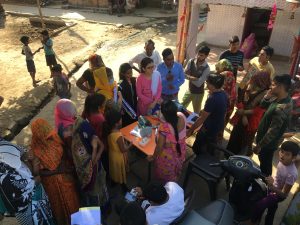Though the term is increasingly bandied around, what does ‘decolonising philanthropy’ mean and how does it work?
Reading the term ‘decolonising philanthropy’ is likely to evoke mixed feelings. Some may feel energised or hopeful, while to others the idea might cause feelings of frustration, apprehension or discomfort. This special feature presents contributors from philanthropic practice and scholarship with an important opportunity to not only unpack the concept of decolonising philanthropy, but to highlight what best practice in this space looks like.
As guest editors from the academic sector, we also aim to use this space to demystify the often unwieldy conceptualisation of decolonised philanthropy. Indeed, many in the sector from elite donors down to grassroots community organisations may be practising decolonised forms of philanthropy unknowingly. But primarily, we aim to inform and stimulate further dialogue around the issue, as it is an essential step towards a broader paradigm shift in the sector.
Decolonising embedded power structures
As has been widely established by scholars and practitioners alike, colonisation extends far beyond the occupation of a foreign land by force. Nowadays, the colonial relics that must be undone are societal, economic and often psychological.
Philanthropy operates within and through these residual structures, and its role and immense power is being challenged. Increasingly, those involved in the sector are acknowledging that while philanthropy has undoubtedly contributed to the upliftment of communities over many generations, acts of generosity should not absolve the individuals from accountability for undesirable consequences of their actions. But beyond simple accountability lies a further set of trickier questions. How should prominent philanthropists distribute the power that naturally comes with being a wealth creator? What can the philanthropy sector do to deploy financial capital in ways that put social justice and equality at the core? To what extent can local actors influence how philanthropists use their enormous social capital, often a result of individual wealth and/or social class?
While a significant portion of global philanthropy is dedicated to addressing the symptoms of poverty and inequality, decolonising philanthropy must focus on changing the underlying systems of our society. Given the inherent power asymmetry between the funders and ‘beneficiaries’, decolonised philanthropy must focus on breaking the perennially reinforced cycles of hierarchical oppression.
Acts of generosity should not absolve the individuals from accountability for undesirable consequences of their actions.
One important power dynamic to tackle is the frequent lack of domain knowledge philanthropic funders possess. There are persistent debates about how much knowledge and experience philanthropists should have of the social issues they are trying to solve before they intervene. Philanthropy initiatives can have long-lasting effects on social practices and social structures in particular areas. All too often, the lack of adequate knowledge about specific communities and an underappreciation (or underutilisation) of community wisdom leads to increased challenges or potentially failed programmes. For example, technology is often thought of as the holy grail for problems in education and many philanthropic organisations fund tech-based solutions. But communities that are not prepared through capacity or infrastructure for large-scale technological advancements are often unable to maintain these programmes, which often leads to termination of support. For a funder, this may be a brief lesson learned before pivoting to a different area, but the impacts of such funding withdrawals can have deep, long-lasting effects on the struggling communities, most particularly students at the heart of the programmes.
The left-over architecture of colonialism
As Edgar Villanueva notes in his book, Decolonizing Wealth, and expresses in Peer Dialogue, philanthropic organisations across the globe perpetuate the social architecture left behind by colonialism, a trend visible at all levels of the sector. In many instances, funding priorities are donor or founder-centric rather than based on community needs. Furthermore, governing boards for philanthropic foundations and trusts are often completely unrepresentative of the people and communities their activity is meant to serve. A prominent example of this is the
Bill and Melinda Gates Foundation, which, from 2006 until recently, famously numbered only Bill Gates, his ex-wife Melinda, the late Bill Gates senior, and Warren Buffet as trustees. Given the foundation’s enormous power and influence, particularly in formerly-colonised nations which rely on their funding to meet public health and poverty eradication benchmarks, this lack of board-level representation of any relevant thematic or geographic area was even more glaring. In 2022, the foundation appointed several new trustees but has still faced warranted global criticism over their decades of unrepresentative governance.
All too often, the lack of adequate knowledge about specific communities and an underappreciation (or underutilisation) of community wisdom leads to increased challenges or potentially failed programmes.
Readers of this special feature will be able to cite innumerable further examples of philanthropic governance structures which may not be fit for purpose. But how can we analyse these problematic governance issues through a decolonial lens? Some may see a lack of governance diversity as a minor concern in light of the vast funding these organisations and individuals provide towards addressing pressing global concerns. But in practice, an unwillingness by philanthropists to transform governance will result in long-term colonial legacies and top-down power structures remaining in place, severely inhibiting the sector’s potential to move beyond reactive, symptomatic support to combat prominent socio-economic challenges.
Systemic challenges require systemic solutions
The inherent power imbalances in philanthropy form one of the longest-standing challenges for the sector. The relationship between a donor who has the money and a receiver who needs the money will always skew toward asymmetry, so how can philanthropists and practitioners tackle this ever-present but often unspoken imbalance? For example, funders frequently have disproportionate sway over the operations of non-profits they fund, which in many cases includes the imposition of stringent reporting requirements and a push to change a non-profit’s practices despite the local organisation having long-term field experience. Though philanthropy is often touted as a promising alternative to ‘mainstream’ institutional aid, in such instances philanthropic actors risk mimicking the harmful colonial practices commonly found in multilateral funding. These prevailing donor-centric models perpetuate a dynamic of ‘haves’ and ‘have-nots’, in which the ‘haves’ effectively set the expectations of the relationship, further limiting the potential for systemic change.
 A further hindrance to transformational change throughout the sector is the reluctance of some larger donor organisations to rid themselves of colonial practices that preserve the current status quo. A 2021 report commissioned by the Vodafone Foundation revealed the extent of barriers to African civil society organisations being able to secure funding and operate effectively. A key finding was that while certain prominent international philanthropic organisations were prioritising changes towards more localised models, in many cases this involved opening up in-country offices. Rather than generating greater local empowerment and funding distribution, the funder’s head office would distribute to their in-country office, severely limiting the opportunities for long-standing organisations to attract the funder’s support. Moreover, the newly minted in-country offices often poached talented personnel from local organisations that could not match their salaries or benefits. In this way, philanthropic actors can easily find themselves preserving existing power structures and damaging hierarchies, whilst believing they have done something transformational. It is crucial therefore for philanthropic organisations to understand that making a model seemingly more representative does not inherently make it decolonial.
A further hindrance to transformational change throughout the sector is the reluctance of some larger donor organisations to rid themselves of colonial practices that preserve the current status quo. A 2021 report commissioned by the Vodafone Foundation revealed the extent of barriers to African civil society organisations being able to secure funding and operate effectively. A key finding was that while certain prominent international philanthropic organisations were prioritising changes towards more localised models, in many cases this involved opening up in-country offices. Rather than generating greater local empowerment and funding distribution, the funder’s head office would distribute to their in-country office, severely limiting the opportunities for long-standing organisations to attract the funder’s support. Moreover, the newly minted in-country offices often poached talented personnel from local organisations that could not match their salaries or benefits. In this way, philanthropic actors can easily find themselves preserving existing power structures and damaging hierarchies, whilst believing they have done something transformational. It is crucial therefore for philanthropic organisations to understand that making a model seemingly more representative does not inherently make it decolonial.
 To this latter point, we must recognise the growing number of prominent philanthropists from former colonies and the enormous social, economic and political influence they wield. In many instances, these individuals have been practising philanthropy through one-off donations or advocacy for specific social causes but are increasingly encouraged to formalise their giving. One major concern is therefore how new philanthropists create their trusts and foundations, who advises them, and what practices they adopt. In most cases, the guidance they receive is from Northern counterparts or consultants with an encouragement to model their philanthropy on colonial framings. As a recent report from the Cambridge Centre for Strategic Philanthropy notes, while philanthropists’ intention to alleviate social issues is commendable, it must be acknowledged that truly decolonised philanthropy calls for more than just an increased number of representative non-white philanthropists, if these individuals are potentially recreating harmful practices in their home countries. Philanthropists and philanthropic organisations must support a progressive restructuring of their own operating models, with the goal of bringing about transformative change. This requires an intentional and critical engagement with issues of power and change, a deeper understanding of how wealth is accumulated and an acknowledgement of how colonial systems and mindsets continue to thrive in both implicit and explicit ways.
To this latter point, we must recognise the growing number of prominent philanthropists from former colonies and the enormous social, economic and political influence they wield. In many instances, these individuals have been practising philanthropy through one-off donations or advocacy for specific social causes but are increasingly encouraged to formalise their giving. One major concern is therefore how new philanthropists create their trusts and foundations, who advises them, and what practices they adopt. In most cases, the guidance they receive is from Northern counterparts or consultants with an encouragement to model their philanthropy on colonial framings. As a recent report from the Cambridge Centre for Strategic Philanthropy notes, while philanthropists’ intention to alleviate social issues is commendable, it must be acknowledged that truly decolonised philanthropy calls for more than just an increased number of representative non-white philanthropists, if these individuals are potentially recreating harmful practices in their home countries. Philanthropists and philanthropic organisations must support a progressive restructuring of their own operating models, with the goal of bringing about transformative change. This requires an intentional and critical engagement with issues of power and change, a deeper understanding of how wealth is accumulated and an acknowledgement of how colonial systems and mindsets continue to thrive in both implicit and explicit ways.
So what does decolonising philanthropy mean in practice? While there are unfortunately no silver bullets or quick-fix solutions to such an entrenched issue, existing research and the subsequent contributions in this special feature uncover the following ways in which philanthropic practices and donations can be decolonised:
1. Empower the communities. Philanthropy should acknowledge its own advantages, privileges and power dynamics, and work alongside the communities and individuals who are closest to the problems. Active solutions involve co-creating philanthropic strategies, with regular inputs and feedback from local organisations and communities, where the focus is on building resilient societies and addressing the power imbalances that have existed for hundreds of years.
2. Focus on the historically marginalised groups. Decolonising philanthropy must involve an intersectional lens that takes into account issues of gender, age, caste, religion and ethnicity. Philanthropists should prioritise inclusion of the most vulnerable groups in a particular society, and incorporate them into the strategy and design of all funding initiatives.
3. Internal diversity and transparency. Philanthropists and funders can begin the broader decolonising process by looking internally. Are grantees and local communities involved in the funder’s decision-making? If not, creating a space within a foundation’s governance structure for diverse local voices is a crucial first step.
4. Trust the process without controlling it. While working towards long-term social transformation through trust, partnership and flexibility is not an easy process, philanthropists can use these opportunities to create collaborative and horizontal relationships with the communities they support – communities that are most affected by social inequities. Investments in building trust with partners will also enable minimising compliance procedures that can often be onerous and costly.
An unwillingness by philanthropists to transform governance will result in long-term colonial legacies and top-down power structures remaining in place.
The contributions to this special feature examine what decolonising philanthropy looks like in practice, using insights from organisations all around the world. Is the needle moving towards the practices highlighted above? What countries and institutions are at the forefront of decolonising philanthropy? What examples are there of decolonising practice by foundations? What forms have these taken, what has the experience been like and how successful have they been? Our special feature examines many of these questions through the lens of diverse stakeholders including philanthropists, funders and grantees, thought leaders, non-profit executives, and philanthropy think-tanks. We hope that these discussions and more prescriptive examples can aid the sector in further advancing this conversation beyond the page and into practice.
Shonali Banerjee is senior research associate, Centre for Strategic Philanthropy at Judge Business School, University of Cambridge.
Email: s.banerjee@jbs.cam.ac.uk
Urvi Shriram is lead, Centre of Philanthropy for Social Justice at the Indian School of Development Management.
Email: urvi.shriram@isdm.org.in






Comments (0)